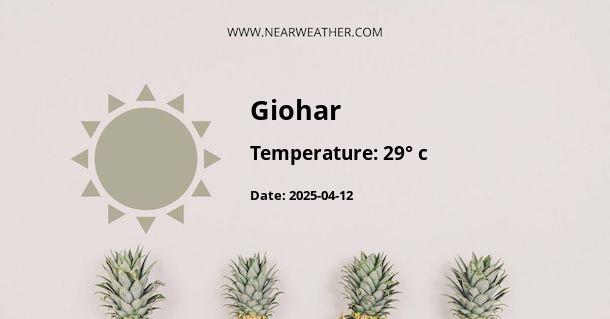Giohar Weather Today
Daily Weather Forecast & Temperature in Giohar
Sun & Moon
Location Info
Embed This Weather
About Jawhar, Somalia
Jawhar, also known as Jowhar, is a city in southern Somalia. It is the capital city of the Middle Shabelle region and is known for its rich agricultural potential. This city serves as an important commercial hub for the agricultural sector in the country.
Climate of Jawhar, Somalia
Jawhar experiences a tropical savanna climate, characterized by a prolonged dry season and a shorter rainy season. The Koppen Climate Classification system classifies its climate as Aw, which is common in regions near the equator.
Temperature
Jawhar experiences high temperatures throughout the year due to its proximity to the equator. The average annual temperature is around 27.5°C (81.5°F). The hottest months are usually February and March, where temperatures can rise up to 35°C (95°F), while the cooler months, July and August, have average temperatures around 24°C (75.2°F).
Rainfall
In Jawhar, the rainy season spans from April to June and a shorter one from October to November. The city receives an average annual rainfall of about 750 mm. The heaviest rainfall typically occurs in April and May.
Weather Patterns Throughout the Year
The weather in Jawhar, Somalia, is generally predictable, with a clear distinction between the rainy seasons and the dry seasons.
Dry Season (December to March, June to September)
The dry season in Jawhar is characterized by little to no rainfall, high temperatures, and low humidity. This season is ideal for outdoor activities and agricultural practices such as planting and harvesting.
Rainy Season (April to June, October to November)
The rainy season in Jawhar is characterized by heavy rainfall, cooler temperatures, and high humidity. During this period, the city experiences an increase in agricultural productivity. However, the heavy rainfall may lead to challenges such as flooding and road inaccessibility.
Impact of Climate on Jawhar's Economy
The climate of Jawhar has a significant impact on the city's economy. With agriculture being a major economic activity, the weather patterns largely determine the agricultural productivity of the region.
Agriculture
The rainy seasons are crucial for the city's agricultural sector. The heavy rainfall experienced during these periods provides much-needed water for crops. However, excessive rainfall can also lead to issues such as soil erosion and flooding, which can harm crop production.
Livestock
Similarly, the climate also impacts the livestock sector. During the dry seasons, the availability of water and pasture for livestock is limited. This can lead to reduced livestock productivity and increased vulnerability to diseases.
Climate Change Impact
Like many other regions around the world, Jawhar is facing the impacts of climate change. These impacts include changes in rainfall patterns and increased temperatures, which pose significant challenges to the city's agricultural sector.
Conclusion
In conclusion, the climate and weather patterns in Jawhar, Somalia, significantly influence the city's social and economic activities. Understanding these patterns is essential for planning and decision-making, particularly in sectors such as agriculture and livestock.
What is the Latitude and Longitude of Giohar?
Giohar's Latitude is 2.780870 & Longitude is 45.500481.
What is the weather in Giohar today?
Weather in Giohar is 36° today.
What is the climatic condition of Giohar today?
Climate Conditions in Giohar shows scattered clouds today.
What is the humidity in Giohar today?
Humidity in Giohar is 21% today.
What is the wind speed in Giohar today?
Wind speed in Giohar is 17.03 km/h, flowing at 37° NE wind direction.
What does it feel like in Giohar today?
It feels like 35° in Giohar today, with 31% cloud cover and 10 km visibility.
